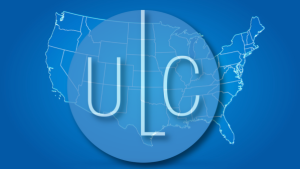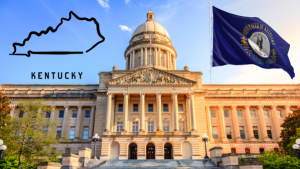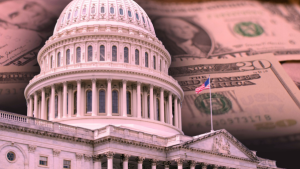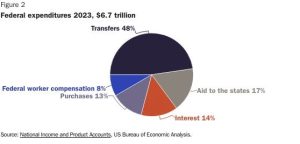Life, Liberty, Property #55: stocks hit record highs on Fed announcement that it is planning three interest rate cuts, sometime later this year.
by S.T. Karnick
IN THIS ISSUE:
- Stocks Hit Record Highs on Fed Announcement
- Overly United States
- Kentucky House Passes Tough DEI Ban for State Universities
- House Passes Spending Bills, Averting End of the World
- Cartoon
SUBSCRIBE to Life, Liberty & Property (it’s free). Read previous issues.
 Stocks Hit Record Highs on Fed Announcement
Stocks Hit Record Highs on Fed Announcement
The U.S. stock markets hit record highs on Thursday as the Federal Reserve (Fed) indicated that it is planning three interest rate cuts over the rest of the year. Stock markets around the world also rose. The Stoxx Europe 600 index hit a record high.
Business Insider reports:
According to the dot plot of interest rate projections for the coming years, officials still expect three rate cuts in 2024.
CME’s FedWatch Tool shows traders have ramped up bets for a June rate cut over the last 24 hours, with odds for easing to start in June jumping from 55% to almost 70%.
The markets are betting on a “soft landing” in which inflation cools without causing a contraction in business activity and a surge in unemployment. In that scenario, the Fed can safely reduce interest rates, which will stimulate economic growth, and thus stock values.
That is the conventional thinking, anyway. The free-market Committee to Unleash Prosperity (CTUP), however, argues that “The Inflation Dragon Is NOT Dead”:
Are we the only ones looking at commodity prices?
They are headed back up again and over the last year diesel, cotton, gold, and others are up more than 10% over the last year with much of the rise in the last few months.

This is a LONG way from the Fed’s 2% inflation target.
While the Consumer Price Index reports on prices from a month ago, commodity prices happen in real time and are a leading indicator of economic trends because commodities supply inputs into the production of all goods and services.
“What this is telling us is there is NO case now for interest rate cuts and if these spiraling costs continue, the Fed should keep selling assets on its multitrillion-dollar balance sheet and Congress should cut spending by at least 10% across the board,” CTUP concludes.
Meanwhile, supply-side economist Alan Reynolds notes that the actions of the Federal Open Market Committee (FOMC) regularly deviate quite radically from its projections:
 The green line compares their previous long-run estimates with what the FOMC ended up doing to fed funds rate—which was completely different. …
The green line compares their previous long-run estimates with what the FOMC ended up doing to fed funds rate—which was completely different. …
FOMC future projections get far more attention than they deserve because they are always wildly wrong, rarely even getting up-down directions right.
Those who are betting that the Fed will cut interest rates soon should keep Reynolds’s graph in mind.
In addition, interest rates may not be the important factor at this point. Powell noted in his Thursday statement that “the Committee will continue reducing its holdings of Treasury securities and agency debt and agency mortgage-backed securities, as described in its previously announced plans.” That means the Fed will continue to tighten the money supply, which will increase the constraints on economic activity:
 This is a continuation of the greatest tightening of the money supply since 1933, and lesser ones have resulted in recessions. Perhaps the stock market’s reaction to the Fed’s announcement is a classic case of “irrational exuberance.”
This is a continuation of the greatest tightening of the money supply since 1933, and lesser ones have resulted in recessions. Perhaps the stock market’s reaction to the Fed’s announcement is a classic case of “irrational exuberance.”
Sources: Business Insider; Committee to Unleash Prosperity; Alan Reynolds on X; Board of Governors of the Federal Reserve System
 Overly United States
Overly United States
As I noted in my opening essay last week, the century-plus steady arrogation of power by the federal government in the United States has resulted in increasingly incompetent governance, contempt for the public, and portents of an upcoming collapse. The people have expressed rising disdain for the federal government, and the states have responded with measures to resist some of the feds’ most flagrantly unjust and unconstitutional initiatives and mismanagement.
I believe that this process of decentralization is inevitable and will happen either by a prudent relinquishing of the unjust accumulated powers or by a simple collapse in which the central government can no longer project sufficient might and money to enforce its directives nor the ability to win public acceptance of its actions.
The election of Donald Trump to the presidency in November could (just possibly) mark the beginning of a desperately needed rollback of federal power. Reelection of President Joe Biden or a similar individual as his chosen successor would result in a collapse within a few years, according to my assessment of the situation.
In either case, authority will devolve to the states—either in an orderly, phased manner or abruptly, amid social chaos.
The states, however, will have to overcome their own centralizing forces, especially as embodied in the somewhat obscure Uniform Law Commission (ULC). Since its inception in 1892 (at the beginning of the Progressive Era, by no coincidence), this nongovernmental, nonprofit organization has produced more than 400 laws which states have adopted to create uniformity in their regulation of business and legal matters, and even in family law and social issues.
The ULC drafts the laws, and the state governments pass them. The Uniform Commercial Code (UCC) that has resulted from these efforts is intended, as the name indicates, to ensure that businesses have the least amount of friction in serving customers in multiple states.
Of course, this force for uniformity conflicts with the states’ ability to function as “laboratories of democracy” fostering a variety of ways of life across the nation and affording maximum freedom. In addition, like any organization, the ULC has been subject to capture by big-government radicals and other advocates of forced social change. As my Heartland Institute colleague Justin Haskins notes at The Federalist, the ULC began with the best of intentions, but those are now long gone:
For much of the 20th century, the ULC played an important, nonpartisan, uncontroversial role in helping states adopt uniform laws. But in recent decades, the group has become increasingly more radical. It now regularly pushes policymakers to adopt legislation that undermines the rights of individuals and enhances the power of governments, large corporations, and financial institutions.
Haskins provides several examples, such as this:
Take, for example, the disturbing model bill titled the Public-Health Emergency Authority Act (PHEAA). The ULC drafted and formally approved PHEAA in 2023, and it’s now asking legislators to pass it into law.
In the event that a “public health emergency” breaks out in the future, the PHEAA would effectively turn governors across the country into all-powerful quasi-dictators.
This proposal would take all the worst things that governors did (in many cases illegally) during the 2020 pandemic and encode them in the laws of all 50 states, Haskins notes:
Under the ULC’s public health emergency bill, governors would have the right to seize control of virtually every part of their citizens’ lives. They could, for instance, regulate the “zoning, operation, commandeering, management, or use of buildings, shelters, facilities, parks, outdoor space, or other physical space, and the management of activities in those places.”
They would also have the authority to single-handedly regulate public-health-related “testing, isolation, quarantine, movement, gathering, evacuation, or relocation of individuals.”
Governors could further kill, relocate, and manage plants and animals in the state, as well as suspend “a provision of any statute, order, rule, or regulation if strict compliance would hinder efforts to respond to the public-health emergency or pose undue hardship or risk.”
The ULC would also grant governors the right to conduct unlimited “surveillance, monitoring, or assessment of the public-health emergency or any of its effects.”
That is an enormous amount of power, and the proposed bill would enable governors to evade time limits on these emergency declarations by allowing them “to renew an emergency with minimal oversight from legislatures, and to do so for an infinite number of times,” Haskins writes.
As we observed in issue number 45 of this newsletter, in the 1990s the UCC wrote and promoted state legislation that stealthily removed people’s property rights to their own investments, a rule which is now on the books in all 50 states. “Instead, ownership belongs to their bankers, brokers, or, in the vast majority of cases, the custodians holding securities on behalf of brokers or banks,” Haskins notes. In case of bankruptcy, “Individual investors and pensions were effectively pushed to the back of the line, putting them in grave danger of sustaining significant losses in a future financial crash,” Haskins writes.
In addition to all of that, “the ULC has been the primary supporter of making alterations to state legal codes so that it would be easier for financial institutions to use a traceable, programmable, controllable central bank digital currency, should the federal government ever create one,” Haskins writes.
The ULC also established the notion of brain death decades ago, to make it easier for health care workers to harvest people’s organs while their bodies are still functioning. The commission is considering broadening the definition further in a revision of its Uniform Determination of Death Act, “to give hospitals and doctors more leeway in declaring patients clinically dead,” my Heartland Institute colleague AnneMarie Schieber reported in Health Care News last October.
“As all of these examples clearly illustrate, the ULC is not, as its advocates often claim, a non-ideological organization focused exclusively on convincing states to pass uncontroversial legislation about commercial law. In fact, it’s quite the opposite,” Haskins notes. ULC recommendations regularly trample on individual rights in favor of big government and big business. The ULC has been “actively fighting recent attempts by some state lawmakers to give priority back to individual investors suffering from the bankruptcy of a broker,” Haskins notes.
States should view with skepticism any upcoming suggestions from the ULC, and they must look through their statutes to find UCC laws that urgently require reform. The restoration of individual rights will require major changes on both the federal and state levels. The states had best get started now, before the travails of the federal government give them more than they can handle.
Sources: The Federalist; Health Care News
 Kentucky House Passes Tough DEI Ban for State Universities
Kentucky House Passes Tough DEI Ban for State Universities
Kentucky is preparing to follow the lead of Florida in banning diversity, equity, and inclusion programs at the state’s government-funded universities.
The Kentucky House version of the bill is much tougher than the version the Senate passed earlier, Fox News reports:
“The overhauled bill passed the House by a vote of 68-18, sending it back to the Senate, which passed a much different version,” AP News reported. “House members stripped away the Senate’s language and inserted a replacement that takes a tougher stand on DEI initiatives at public university campuses. The Senate will decide in coming days whether to accept the new version. The GOP has supermajorities in both chambers.”
“This bill would put an end to the failed, expensive and discriminatory DEI initiatives at our public post-secondary schools in Kentucky,” Kentucky State Rep. Jennifer Decker said, per the outlet.
The Senate bill included solid and rather comprehensive definitions of DEI initiatives, the Lexington Herald-Leader reports:
The bill would prohibit certain initiatives at Kentucky’s public colleges and universities that promotes “divisive concepts,” such as “race or sex scapegoating,” a belief that some individuals are “inherently privileged,” or suggestions that all “Americans are not created equal.”
Concepts considered “divisive” that would be prohibited under [Sen. Mike] Wilson’s proposal include:
- That an individual, by virtue of the individual’s race or sex, is inherently privileged, racist, sexist, or oppressive, whether consciously or subconsciously.
- The Commonwealth of Kentucky or the United States of America is fundamentally or irredeemably racist or sexist.
- An individual, by virtue of the individual’s race or sex, bears responsibility for actions committed in the past by other members of the same race or sex.
- A meritocracy is inherently racist or sexist, or designed by a particular race or sex to oppress another race or sex.
- Promotes or advocates the violent overthrow of the U.S. government.
Decker’s bill passed the House on a 68-18 vote and now goes to the Senate for final approval. The Senate passed its version 67-7.
Those supermajorities mean that the bill can easily survive a veto by Gov. Andy Beshear. Beshear, a Democrat, has spoken out against the legislation, the Lexington Herald-Leader reports.
“I’m worried that this is the bogeyman to rile people up in yet another election as opposed to talking about what it really means,” Beshear said. “This is something that means going into communities that have been overlooked for a number of reasons—from racism, to poverty, to parts of of rural America—and it’s something that ultimately, from a federal government standpoint, can mean more dollars coming into Kentucky instead of less.”
In addition to being diametrically opposed to what the public wants tax-supported institutions to do, DEI is an extremely expensive and wasteful proposition, said Decker and a University of Kentucky student who spoke in favor of the bill, WKYT reports:
Rep. Jennifer Decker (R-Waddy) says Senate Bill 6 seeks accountability from these institutions. She says misguided DEI bureaucracies in higher education have cost the state tens, if not hundreds of millions of dollars, with a UK student speaking to the ‘egregious spending’.
“10.5 million dollars,” said Gavin Cooper, a junior at UK who supports the bill. “That’s the salary of the DEI offices at UK, and only $382,000 goes towards scholarships.”
The legislation would also protect students from discrimination and harassment by university administrators and professors. “The bill requires that universities must adopt a policy of ‘viewpoint neutrality’ and that students can’t be treated differently based on protected classes like religion, race or sex,” WKYT reports.
Decker’s bill zeroes out funding for DEI, WKYT reports:
Rep. Decker presented Senate Bill 6 in the absence of its sponsor, Sen. Mike Wilson (R-Bowling Green). She filed her own version of this bill, House Bill 9, and a new committee substitute to the Senate’s bill has now adopted much of that language.
“They shall no longer expend any resources—monetary, human, physical or digital—on DEI offices, officers, trainings and initiatives,” Rep. Decker said as she described the bill’s provisions.
That’s how you do these things. Kudos to Rep. Decker.
As I told The College Fix for an upcoming story, DEI programs are the academic equivalent of tearing down the statues of great leaders of the past. These programs do students and their parents a disservice, fleece the taxpayers to support race-baiting and a war on masculinity, and undermine the foundations of the civilization on which those very institutions depend. That is, in fact, the intent of DEI.
Taxpayers should not be dragooned into supporting these enormously destructive activities either directly or indirectly. The federal government should require all academic institutions that accept students’ Pell Grant or federal student loan money, or any other support through government funding or regulations, to ensure that, at minimum, all campus programs align with the nation’s Bill of Rights. States should do likewise, as Florida has done and Kentucky is doing.
DEI has no place in any publicly supported organization. Institutions that want to undermine our freedoms of speech, religion, assembly, and firearms and the other rights and privileges of citizens of the United States should do so without taxpayer support. Scholars have a right to think and say whatever is on their minds. They have no right to use other people’s money for that purpose.
DEI is not academic freedom; it is intellectual tyranny.
Sources: Fox News; WKYT; Lexington Herald-Leader
 House Passes Spending Bills, Averting End of the World
House Passes Spending Bills, Averting End of the World
The U.S. House of Representatives predictably passed the package of spending bills necessary to keep the federal government running through the end of the fiscal year on September 30, coming in just under the wire of another government shutdown deadline. The vote was 286 to 134, exceeding the two-thirds supermajority required for approval under the process used for this type of legislation.
At present, the federal government has spent “$828 billion more than it has collected in fiscal year (FY) 2024,” the Treasury Department reports. That’s an increase of $106 billion over the deficit at this point in the previous fiscal year.
“Since 2015, the Spending to GDP ratio has increased from 20% to 23%,” Treasury notes.
Here’s what all that spending gets us, according to Chris Edwards of the Cato Institute:
Redistribution Dominates Federal Spending
Figure 2 breaks down federal spending in 2023 into five components based on the [U.S.
Bureau of Economic Analysis] data. Transfers to individuals and businesses account for 48 percent of federal spending. Some of the largest transfer programs are Social Security, Medicare, food stamps, and refundable tax credits. These programs do not add to gross domestic product (GDP) or national income but rather redistribute existing resources from taxpayers to program recipients.

As Edwards notes, the $3.2 trillion in transfer payments adds nothing to the nation’s economic output but instead extracts resources from taxpayers and sends them to other people. The same is true of the $938 billion in interest payments, which go to financial institutions and people who hold bonds.
That’s more than $4 trillion that does nothing but move money around, from disfavored people to favored ones.
People voluntarily redistributing their income to others is laudable charity. Redistributing other people’s income is called theft. Except when the government does it.
Sources: United States Department of the Treasury; Cato Institute
Cartoon

via Comically Incorrect
For more great content from Budget & Tax News. For more Rights, Justice, and Culture News.
For more from The Heartland Institute.










